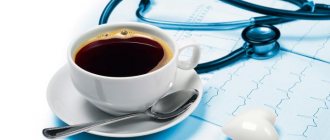Why are there so many myths, guesses and confusion surrounding the benefits of coffee? (Can everyone drink coffee)
Before we talk about the benefits of coffee and look at some of the research that points to it, I want to convey one important point to you.
Coffee affects each of us completely differently.
And while ample evidence shows that coffee can have a positive effect on life expectancy and reduce the risk of developing serious diseases, we should remember that coffee can be both very beneficial for some people and very harmful for others.
Because despite all our similarities, we continue to be different. And the only working way to understand whether you should drink coffee is to take a comprehensive approach to this issue.
First, you should pay attention to the symptoms that occur after consuming it. Is there irritability, lethargy, hyperexcitability, insomnia?
Secondly, you need to make sure that you are not part of the group of people who should not drink coffee (temporarily or at all) for various reasons. I will list them a little later.
Thirdly, those who are especially advanced and love to get to the very essence can take a genetic analysis. This will help you understand how quickly your body absorbs the caffeine it receives.
We will talk about all this later in the article. But we’ll start with research on the benefits of coffee.
5 beneficial properties of coffee: what it can protect us from and what it will help us cope with (is it really possible to drink coffee for your own benefit?)
Over several decades, many studies have been conducted on the benefits of coffee. As a result, we found that it can not only reduce the risk of developing diseases of the cardiovascular system and oncology, but also slow down aging and serve as a preventive measure for Parkinson’s disease and depression.
Moreover, two large studies published in July 2017 (Annals of Internal Medicine) suggested that drinking coffee in general may reduce mortality. This pattern and relationship “coffee consumption - increased life expectancy - decreased mortality” was observed among various European populations, races and ethnic groups. ()
Let's talk about the benefits of coffee in even more detail.
Coffee is a source of antioxidants that protect the body from inflammation and oxidation
Chronic inflammation and oxidative damage can significantly increase the risk of many common diseases (cardiovascular disease, oncology, metabolic syndrome, diabetes, etc.) We are talking about oxidative stress - the process of cell damage as a result of oxidation.
This means that anything that has an antioxidant effect can protect cells from the effects of free radicals, prevent and even reverse many diseases, and generally slow down the aging of the body. And this is where coffee comes into the picture.
First, coffee contains caffeine, a natural source of antioxidants. Secondly, coffee contains a lot of polyphenols - compounds that have an antioxidant effect.
What do we get as a result? Coffee may turn on antioxidant genes, protect against oxidative damage to the gastrointestinal tract and DNA (), reduce inflammation in body tissues, and have a beneficial effect on “good cholesterol” levels. ()
Coffee may reduce the risk of heart disease
In a review and meta-analysis of 36 studies, researchers found an association between coffee consumption and a reduced risk of cardiovascular disease. Moreover, those who drank 3-5 cups of coffee a day had minimal risk. ()
Essentially, this means that coffee can protect us from coronary heart disease, stroke, heart failure, and overall premature death from cardiovascular disease.
It was found, for example, that people who regularly drank at least 1 cup of coffee per day had a 20% lower risk of stroke compared to those who rarely drank coffee. (,)
Finally, regular coffee consumption was associated with higher levels of good cholesterol and lower levels of bad cholesterol, a reduced risk of metabolic syndrome, and a reduced risk of obesity and type 2 diabetes. (,,,)
Coffee may reduce the risk of cancer
Drinking caffeinated coffee may reduce the risk of developing postmenopausal breast cancer, reduce the number of recurrences in women diagnosed with breast cancer, and even inhibit the growth of an existing tumor.
All this happens because coffee contains hundreds of biologically active compounds (flavonoids, lignans and other polyphenols). And they can suppress metastasis, regulate genes involved in DNA repair, protect cells, and also curb inflammation.
More than 1,000 studies have found a link between coffee and the successful prevention of certain types of cancer. (,) Including breast cancer, liver and colon. (,,,,)
Coffee may prevent Parkinson's disease
Various studies indicate the possibility of reducing the risk of developing the disease by 32-60%. (,,) Scientists suggest that the positive trend occurs due to the good state of the intestinal environment. And it, in turn, occurs due to increased intestinal motility caused by drinking coffee. ()
It could also be that caffeine is a neuroprotectant. That is, a medicinal substance that protects brain cells from damaging influences, prevents their death and improves their functioning.
By the way, caffeine will protect you from Parkinson's disease regardless of how quickly your body absorbs it. A little later we will talk about slow and fast metabolizers.
Coffee may protect against depression
A large study of more than 50,000 women found that the risk of depression was reduced by drinking caffeinated coffee. ()
Perhaps this is the case when a cup of good freshly brewed coffee with spices (cardamom, cloves and pepper) can be an excellent prevention of winter blues caused by short daylight hours.
If you're interested in looking at the history of coffee and depression in numbers, a 2021 study will tell us that men and women who drink coffee frequently (2 cups or more a day) are 32% less likely to suffer from depression than those who don't drink coffee at all. doesn't drink coffee. ()
Who benefits from drinking coffee?
To summarize, I would like to say that you can drink coffee (and it will be good for you!) if you generally feel good and do not experience unpleasant symptoms when drinking it. That is:
- You sleep well: you fall asleep easily, sleep soundly, and wake up quite refreshed.
- You have the strength to play sports, you manage to improve your results in sports, and you recover quickly after training.
- There are no symptoms of chronic fatigue: constant lack of strength, irritability, distracted attention.
- You don't feel hyperexcited or sleepy after drinking a cup of coffee.
If at least one of the above statements does not correspond to your reality, try to reconsider your addiction to coffee. Plus, remember that in addition to these symptoms, there are a number of contraindications and a genetic factor that are also important to consider. I will talk about them in more detail later in the article.
If you are worried and are already frantically imagining how you will wake up and invigorate without your favorite coffee, then I have a surprise for you. In fact, coffee cannot give us a real boost of energy.
Caffeine content in drinks
On average, ground natural coffee contains 70-140 mg of caffeine in 1 cup (41-82 mg per 100 ml).
According to scientists, in instant coffee (both freeze-dried and powdered) the amount of caffeine is 30-40% less and ranges from 30 to 90 mg per 1 cup (17.6-53 mg per 100 ml).
The concentration of caffeine depends on the type of coffee beans (for example, “Robusta” has 2 times more than “Arabica”), the duration of roasting and various technological features of production.
The table shows the caffeine content in the most popular coffee drinks and other products.
| Drink | Caffeine per serving | Caffeine per 100 ml drink |
| Espresso | 59 mg (30 ml) | 196 mg |
| Americano | 68 mg (70 ml) | 97 mg |
| Cappuccino | 68 mg (180 ml) | 38 mg |
| Black tea | 80-100 mg (200 ml) | 40-50 mg |
| Green tea | 40-60 mg (200 ml) | 20-30 mg |
| Coca-Cola | 55 mg (500 ml) | 11 mg |
| Pepsi-Cola | 30 mg (500 ml) | 6 mg |
| Energetic drinks | 100-175 mg (500 ml) | 20-35 mg |
Thus, different types of coffee and coffee drinks contain different amounts of caffeine. Its content is influenced by many factors: from the type of grain to the duration of “brewing.”
What about vigor and strength? Don't they increase in number when we drink coffee?
Surprisingly, the answer to this question is no!
In reality, coffee does not give us a real boost of energy. It simply blocks the feeling of drowsiness for a while (and then only for some people).
Here's how it works.
The neuromodulator adenosine causes drowsiness. Caffeine blocks adenosine receptors and temporarily increases our alertness and attention. It turns out that when we drink coffee, it only seems to us that we have more energy. But in reality, we simply stop accepting our body's signals about sleepiness.
Some time after drinking coffee, we may again feel tired and sleepy. At the same time, most likely, they will be felt even stronger and more clearly.
And since brain cells tend to adapt to constantly incoming doses of caffeine and produce even more adenosine receptors, over time we will have to significantly increase the dose of caffeine in order to achieve the “invigorating” effect to which we are accustomed.
Remember: if you constantly feel tired or stressed, the best way to get yourself into optimal health is to eliminate the underlying stressors that cause fatigue. And don’t try to stimulate your body with doping. Whether it's an energy drink, strong tea or coffee.
Daily caffeine intake
The amount of caffeine per day varies between 300-400 milligrams. Standard espresso contains about 120 milligrams of the alkaloid, and Turkish espresso contains about 170. Based on this, it will be possible to calculate the optimal permissible consumption rate. Caffeine abuse will lead to disruption of the heart and nervous system. Therefore, it is strongly recommended not to exceed the indicated dosage.
True coffee lovers cannot imagine even a day without their favorite drink. Its use is a special ritual that helps replenish strength and get a boost of energy. It is worth remembering that excessive consumption of espresso, Americano and even cappuccino will negatively affect your health. Therefore, you need to drink it in moderation, without exceeding the permissible daily intake.
One of the most popular drinks worldwide is natural black coffee. Many people always invigorate themselves in the morning with a fragrant cup. Some scientists claim the harmful effects of coffee on the body, while others, on the contrary, are delighted by discovering new properties of the drink. Note that the percentage of people who drink real bean black coffee is small; the rest drink the invention of the Swiss chemist Max Morgenthaler - instant black coffee. Although it is easy to prepare, its taste is inferior to the original coffee. It is known that instant coffee contains more caffeine, so drink lovers should be advised to drink grain coffee - this is the only way to appreciate the full taste, and there are more health benefits. How much coffee can you drink at one time, per day, without fear of harming your body? We will try to answer this question in the article.
Who should not drink coffee: 9 cases when it is better to refuse the aromatic drink
In the previous part of the article, we spoke so confidently about all the benefits that coffee can bring to our lives. Then what's the point of giving it up?
Here's what it is. Each of us is individual. There are important differences between us, which can play a decisive role in the case of drinking coffee.
Genetics, gut microbiome, lifestyle, diet, activity level, stress level, constant fatigue, gluten intolerance, headaches - all these factors determine how our body reacts to coffee and caffeine. Sometimes they force us to give up coffee completely or significantly reduce its consumption.
And again, this is really important to consider. Drinking coffee regularly if the factors listed below are present is a truly bad idea.
Increased stress levels (possibly chronic fatigue syndrome)
The temptation to drink coffee heavily to cheer yourself up when you are constantly nervous, worried and stressed is great, but you shouldn’t do that. Coffee activates stress hormones and suppresses actual feelings of fatigue.
The fact is that small doses of caffeine (up to half a cup) will have a relaxing effect on the body by reducing the activity of neurotransmitters. But large doses, on the contrary, will cause irritability, anxiety and, paradoxically, increase stress levels.
In addition, coffee can mask and ultimately worsen chronic fatigue syndrome. It’s worth thinking about seriously if you constantly feel tired and don’t get enough sleep. You also notice a sharp loss of strength after lunch and take a long time to recover from physical activity.
In general, if you often find yourself in a state of stress, then you need to gradually and gently give up coffee. By the way, chronic diseases are also constant stress for our body. Gradually and gently are the key words! If you do this abruptly, you may feel very bad for several days (we are talking about severe headaches, irritability, etc.).
A gene variation that prevents caffeine from being absorbed quickly
Sometimes figuring out whether you should drink coffee is quite simple. You just need to get tested for the CYP1A2 gene and find out how well your body tolerates coffee.
I'll tell you a little more.
Caffeine is metabolized by an enzyme in the liver that is encoded by the CYP1A2 gene. Unfortunately, some people have a variation in the CYP1A2 gene, which causes them to process caffeine slowly.
If you have this particular gene variation and drink coffee, then you increase your risk of developing cardiovascular disease, high blood sugar, high blood pressure and interfering with the quality of your sleep. (,,)
To find out if you are a fast or slow metabolizer, you need to get tested for the CYP1A2 gene at a genetic health center. To do this, go to the website of the laboratory or genetic center and enter “CYP1A2” or “rs762551” in the search bar.
An important caveat: It's good to use this analysis as your starting point, but it's worth remembering that there are a number of factors beyond CYP1A2 genotype (which I wrote about in the article) that influence how each of us metabolizes caffeine. This is why even fast metabolizers may react poorly to coffee if they have chronic fatigue.
A noticeable loss of strength
Drinking countless cups of coffee in an attempt to feel alert and energized is an unforgivable mistake that we almost never pay enough attention to.
If you drink coffee and feel frazzled and tired at the end of the day, you may think you need more coffee. But in fact, this may indicate something completely different. Probably coffee has a bad effect on the state of your stress system (HPA axis) or you, without noticing it, are in constant stress or chronic fatigue syndrome.
If coffee really suits you, after drinking it you will feel an inner lift, improved mood and natural mental clarity. That is, in any case, you should not expect superhuman productivity or an extraordinary surge of strength from yourself. The purpose of coffee is only to temporarily relieve drowsiness.
But if after it you feel nervous, hyperexcited and difficult to control, you should clearly give it up gradually.
Also try to look closely at the real reasons for your fatigue, if coffee serves as a source of daily vigor for you. Stop masking your lack of strength and create a plan for optimal improvement. Let them be: a nutrient-rich healthy diet, enough water, good sleep, dealing with stress, taking care of the health of the digestive system and normal blood sugar balance.
Thyroid diseases
Coffee can increase cortisol levels in the body. And it, in turn, can negatively affect all hormones in the body. This includes leading to a decrease in thyroid hormone levels.
This can happen for at least three reasons.
First, cortisol activates the HPA axis, which causes the release of cytokines that can reduce the production of the hormone TSH in brain cells. This can lead to a decrease in thyroid hormones (if the pituitary gland is dysfunctional).
Second, high cortisol levels prevent inactive thyroid hormone (T4) from converting into its active form (T3). This process can lead to symptoms of hypothyroidism such as weight gain, depression, dry skin, fatigue and hair loss.
Third, chronic activation of the HPA axis may reduce the sensitivity of thyroid receptors. Thyroid hormones will send signals to the cells, but the cells will not be able to hear them.
You should be especially careful if you already know you have a problem and are taking medications to support your thyroid gland. To get the maximum benefit from taking your medications, drink coffee no earlier than 60 minutes after taking the pills.
If you are sensitive to caffeine and have thyroid problems, be sure to give yourself a break from regular coffee consumption. And remember about slow and smooth failure.
Hormonal imbalance in women
To understand whether you can drink coffee, it is important for you to be generally aware of the state of your hormonal levels.
Individual sensitivity to caffeine, coupled with a couple of small stresses at work, can in some cases increase the risk of hormonal imbalance, lead to fluctuations in estrogen and testosterone levels and change the status of PCOS. Sometimes for the better, and sometimes for the worse.
A little about how it works.
Coffee increases the amount of sex hormone binding globulin (SHBG). SHBG is a protein that binds to estrogens and androgens in the blood. But to be used by cells, sex hormones must be free and not bound to SHBG. High levels of SHBG leave less hormones available to cells.
In studies, total and free estrogen levels were lower in women with higher coffee consumption compared to women with lower coffee consumption. ()
This estrogen-lowering effect may be beneficial for women with elevated estrogen. But it obviously can cause problems in women with low estrogen. This is especially important to understand for those who have an irregular menstrual cycle.
Intermittent sleep or insomnia
People under constant stress and chronic fatigue are already prone to sleep disturbances. Adding coffee to this explosive mixture is like adding oil to a blazing fire.
Given the fact that caffeine blocks our feeling of fatigue and causes a delay in the circadian rhythm, it is important for us to learn to consciously refuse coffee breaks and a cup of cappuccino at lunch in order to ensure sound sleep and easy awakening.
A small 49-day study of 5 volunteers found that drinking caffeinated drinks literally set back the body clock by an average of 40 minutes. ()
Even if you drink coffee long before going to bed, it can have a negative impact on your sleep. One study found that consuming caffeine even 6 hours before bed reduced total sleep time by 1 hour. ()
If you don't sleep well, but can't give up coffee, try to drink your last cup of coffee (and it's good if it's your only one) 10-12 hours before you go to bed. But it’s better to gradually give it up completely to improve your sleep.
Pregnant
High coffee consumption may increase the risk of premature birth and low birth weight babies. (,)
Try not to drink coffee during pregnancy or drink up to a maximum of 200 ml per day. Limit its volume to 1-2 cups while on breastfeeding. In both cases, the choice should be made in favor of decaffeinated coffee.
Protein intolerance in coffee beans
People with gluten intolerance may have a cross-reaction to proteins in any of the following foods: milk, corn, soy, potatoes, quinoa, amaranth, millet, tapioca, as well as chocolate and coffee.
Coffee is the most common cross-reactant for people with gluten intolerance. Moreover, sometimes it makes no difference what kind of coffee you are dealing with (caffeinated or decaffeinated).
If you have a gluten intolerance and also love coffee, watch your reaction after drinking the drink.
If you experience unpleasant sensations - pain and burning in the upper abdomen, nausea, bloating, constipation, diarrhea, muscle cramps, headache, loss of energy, rash, redness of the skin or swelling of the tongue - try to gradually reduce the amount of coffee consumed to 200 ml per day. If possible, avoid it completely. Or as long as you continue to have a similar allergic reaction.
Obvious dependence on coffee (should you drink coffee when you cannot live without it? - most likely not)
If you feel like you constantly cope with fatigue and drowsiness with the help of coffee, you can’t start your day without it, and you notice that in its absence you have a headache, irritability and anxiety - there is a high probability that you may have an addiction. Yes, yes, coffee can really be truly addictive!
Try gradually reducing the amount of coffee you consume. Gradually is the key word. Yes, I repeat this several times in the article, but it is very important! And I know from experience working with participants in my reFresh programs that many girls want to quickly and completely eliminate coffee.
But if you suddenly stop drinking coffee (and caffeine), you may experience withdrawal symptoms such as headache, insomnia, irritability, and confusion within 12 to 24 hours. They can last from one to seven days.
So, if you constantly feel tired, irritable, have trouble sleeping, get tired during the day, have trouble with exercise, feel dizzy when standing up quickly (postural hypotension), or experience any of the symptoms listed above, you may want to consider replacing coffee with healthier alternatives. .
Acceptable rate
The upper limit of caffeine intake is 500 mg per day. This figure is valid for a completely healthy adult with normal weight. A single dose should not exceed 200 mg. A minimum of 3 hours should pass between doses.
How many times a day can you drink coffee without harm to your health? If we take Arabica espresso as an example, then 1 standard 30 ml serving is approximately 50-70 mg of caffeine. Therefore, you can drink up to 7 such cups per day. A large cup of cappuccino, which tastes much smoother, is two espressos.
It is easy to exceed your daily coffee intake if you drink it from Turkish coffee. Usually about 200 ml is brewed per person, using 2 teaspoons of ground coffee. As a result, a cup contains an average of 130 mg of caffeine. It is not recommended to brew stronger and consume more than 3 times a day.
The instant product also contains quite a lot of caffeine: 100 mg per 2 teaspoons.
Coffee fans can be offered the following safe coffee “diet”: in the morning - double espresso or Turkish coffee, in the afternoon - cappuccino or macchiato, in the late afternoon, but no later than 4 hours before bedtime - latte. In total, you get about 350 mg of caffeine per day, which will not harm a healthy person.
But you shouldn’t always drink 7-8 cups of espresso. If you drink coffee every day, it will be difficult to give it up later: an addiction will form.
- Read more: Consequences of coffee addiction
Table of caffeine content in coffee drinks
| Drink, ml | Amount of caffeine per 100 g/serving, mg | Harmless daily dose, ml | Maximum permissible dose, ml |
| Espresso, 30 | 160 – 220/50 – 70 | 100 – 150 | 250 |
| From Turkey, 200 | 65/130 | 300 – 400 | 800 |
| From French press, 200 | 40/80 | 500 | 1000 |
| Cappuccino, latte or macchiato based on 2 espresso shots, 200-300 | 50 – 60/100 – 140 | 400 – 500 | 1000 |
| Instant, 200 | 40/80 | 500 | 1000 |
How to replace coffee (5 ways to maintain your performance at a high level without coffee)
So, it is important to avoid coffee and caffeine if it has a bad effect on you. It is a good idea to reduce your intake over 2-4 weeks. Depending on how long you drank coffee, in what quantity and for what reason.
While you're at it, I suggest you try healthier alternatives and start looking for the real cause of your lack of energy. After all, in fact, coffee does not solve our problems, but masks them and ultimately makes them worse. So, on the agenda are 5 ways to be more energetic without coffee.
Clean and fresh water in sufficient volume (can you drink regular water instead of coffee and get an invigorating effect? - yes!)
To become more energetic now, the easiest way to start is by drinking enough water. After all, even mild dehydration makes us tired, and we think worse.
Many people make the mistake of drinking little water, and remember about it only in those moments when they feel thirsty. Although in fact, by this point they are already leading themselves to a state of dehydration!
And if dehydration reaches 2%, then fatigue and weakness appear, and the body and brain cannot work at their full capacity.
There is one big pleasant moment in all this: often in order to relieve headaches, concentrate and reduce stress levels, we do not need a cup of coffee, but a sufficient amount of water throughout the day. Therefore, your first priority is to drink more water (about 8-10 glasses per day).
To find out exactly how much water you need to drink during the day (and this is an individual question!), I recommend reading my large detailed article about water.
Matcha green tea
Matcha tea is powdered green tea leaves rich in antioxidants, vitamins, minerals and the highest natural concentration of the amino acid L-theanine.
Matcha may help improve concentration and memory, support the immune system, promote weight loss, and protect against cancer.
Finally, matcha is a great alternative to coffee. A serving of matcha tea (just over half a teaspoon) contains plenty of caffeine. Moreover, caffeine from matcha enters our body very slowly and smoothly (within 8 hours), and usually does not lead to a decrease in energy, sleepless nights or hyperexcitability.
Green smoothies
Lots of greens and vegetables in your diet can significantly increase your energy levels. All thanks to the vitamins and nutrients they contain! And green smoothies are just a great way to include more greens, vegetables and fruits in your nutrition plan.
I suggest you don’t put it off and try the smoothie recipes from my free book now. You can drink such smoothies 2-4 times a week.
Protein smoothies
Protein is one of the important sources of energy for our body. Research shows that adequate protein intake maintains normal blood sugar levels and improves our alertness, concentration and good mood.
To feel energized, try making protein smoothies several times a week. This will be a great snack after breakfast or lunch.
For a protein smoothie, add all of the following ingredients to a regular green smoothie:
- 1-2 tbsp. chia or flax seeds
- Pea/hemp protein or high quality collagen serving
- Instead of water, add ½-1 cup of nut, sesame or pumpkin milk (or if you have a powerful blender, you can simply blend a handful of seeds or nuts with water for a serving of milk)
- 1-2 tbsp. natural 100% cocoa without sugar (optional, but delicious)
Vegetable juices
If you want to cheer up, try drinking freshly squeezed vegetable juices a couple of times a week.
When making green juice, make sure that at least 70-90% of the mixture contains vegetables and not fruit. If you read my article about fruits, then you already know that freshly squeezed fruit juices should not be drunk often because all the fiber has been removed from them. But along with them we can drink too much natural sugar, which will enter our body very quickly (again due to the lack of fiber).
For vegetable juice, add to the juicer: 7 large cucumbers or celery sticks, ½ apple and a bunch of herbs. And add the juice of ½-¼ lemon to the finished juice. During the cold season, you can add a small piece of ginger root while making juice.
Coffee while breastfeeding
Is it possible for nursing mothers to drink coffee?
The birth of a child is not a reason to relax, since a woman has a long period of breastfeeding
. And if previously caffeine entered the baby’s body through the placenta, now it will enter the baby’s breast milk.
What do authoritative sources say about the dangers of drinking coffee during lactation?
not enough research has been conducted worldwide
on this issue. Therefore, the dangers of coffee during lactation are judged on isolated cases.
According to the results of one of the few studies conducted by Polish experts, the average level of caffeine consumption
for women during breastfeeding is 125-165 milligrams per day.











